Last Call for Vin Scully, the King of Los Angeles
After 67 years as Dodgers baseball play-by-play announcer, the 88-year-old legend is retiring at the end of the season—and remains the biggest star in town.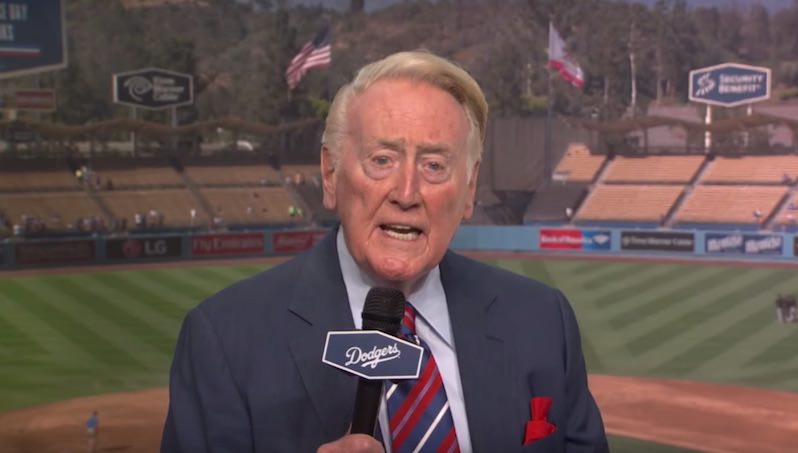
Vin Scully has been broadcasting Dodgers games since 1950. (MLB / YouTube)
No, Kobe Bryant wasn’t the most beloved star in town. Nor was Magic Johnson, Steve Garvey, Fernando Valenzuela, or even Jerry West or Sandy Koufax.
It wasn’t Jack Nicholson, either. He was only a movie star, meaning locals saw him the way everyone else in the nation did: on the silver screen (except for at Laker games).
Los Angeles’ most beloved star is Vin Scully, the announcer for Major League Baseball’s Dodgers, the home team. Scully is nearing the end of his final season—at 88—and getting a royal sendoff like the Ali‘i of Hawaii.
“Listening to Vin call a Dodgers game was like reading [New Yorker essayist] Roger Angell on Luis Tiant’s wind-up,” says sportswriting-great-turned-Hollywood-screenwriter John Schulian. “In an increasingly loud and crass world, there was a quiet elegance about Vin’s work, a touch of the literary combined with just the right amount of wistfulness. … Summer nights will never be the same without the sound of his voice.”
WATCH: Vin Scully’s Call of Kirk Gibson’s Home Run in the 1988 World Series
You do not need a farewell tour like Kobe’s to understand what Scully has meant to the Dodgers franchise.
In a 1976 poll, fans chose Scully as the most memorable Dodger, over all the team’s players.
The first Dodger to make $1 million wasn’t Koufax or Drysdale, whose celebrated 1966 holdout was for a total of only $235,000 ($125,000 for Sandy, $110,000 for Don).
Nor was it pitcher Valenzuela, who asked for $1 million in 1982 after his rookie season when he brought in that much in revenue himself — by drawing an average of 13,000 more fans to the stadium when he started than the team’s other starters, widening the Dodgers’ audience among local Latinos.
The organization, which could renew Valenzuela for his second season, offered $300,000 and refused to negotiate, forcing him to take it.
Scully already was making $1 million in 1982. Garvey, the highest-paid player, was at $370,000.
“Los Angeles is a city of stars, and Vin is the biggest star of them all,” Scully’s broadcast partner Charley Steiner told Sports Illustrated’s Tom Verducci.
“I don’t care who it is—Arnold [Schwarzenegger], Leo [DiCaprio], [Steven] Spielberg, Kobe, Magic—nobody is bigger than Vin, and I’ll tell you why: With everybody else, you can find some subset of people who don’t like them. Nobody doesn’t like Vin Scully.
“Vin is our Babe Ruth. The best there ever was.”
By “our Babe Ruth,” Steiner meant Scully’s fellow announcers, the most devoted of his fans. The best of the next generation, like Al Michaels and Jon Miller, copied Vin’s style with his laid-back delivery that stressed timing and silence over excess verbiage.
Few of the imitators could have explained why as lyrically as Scully himself, recounting his call in 1974 of Hank Aaron’s 715th home run — breaking Babe Ruth’s major league record, which had stood for 39 years. Scully told USA Today’s Bob Nightengale:
I remember George Plimpton was in Atlanta. He was going to write a book on Aaron’s home run. He interviewed everyone and got to me and said, ‘Do you have anything prepared?’ He told me [Braves broadcaster] Milo Hamilton had the whole thing prepared. I said, ‘Well, good for Milo, but I can’t broadcast like that.’
“When Henry hit it, I described it: ‘It’s a high drive into deep left-center field. [Bill] Buckner goes back to the fence. … It is gone.’ Then I just shut up. For a long time.
“I always let the crowd roar. It was like when I was 8 years old and we had this big, four-legged radio in the living room, and the only sports on Saturday was a college football game. I would crawl under the radio, put my head under the speaker with saltines and a glass of milk. And when someone scored, the crowd would go crazy, and that crowd noise would come down and wash over me like water out of a shower head.
“To me, it is absolutely a symphony. I was completely enamored by the crowd noise.
“So I waited, and it gave me time to think. And then I said, ‘What a marvelous moment for baseball. What a marvelous moment for Atlanta and the state of Georgia. What a marvelous moment for the country and the world. A black man is getting a standing ovation in the Deep South for breaking a record of an all-time baseball idol.’”
Actually, it wasn’t altogether marvelous. Aaron had spent an increasingly gloomy runup getting racist mail from baseball fans offended by his effrontery in surpassing a white icon.
If Scully is, indeed, a voice of the establishment, it can truly be said, as Sports Illustrated’s Verducci notes, that he “ranks with Walter Cronkite among America’s most-trusted media personalities, with Frank Sinatra and James Earl Jones among its most-iconic voices, and with Mark Twain, Garrison Keillor and Ken Burns among its pre-eminent storytellers.”
That’s not bad for a mere baseball announcer. But then, maybe that’s the point.
Scully’s real trick was self-effacement, in life as in the booth, as in his 2000 commencement address at Fordham University, where he graduated in 1949 and was hired to work with Red Barber calling Dodger games.
“I’m not a military general, a business guru, not a philosopher or author,” Scully told the graduates. “It’s only me.”
In the media-driven age of Kato Kaelin in which people are famous for being famous, Scully was at the other extreme: someone who became more famous for being so humble.
In a conference call Monday, he said he has tried to keep his final-season curtain call and the outpouring of praise in perspective, “even though it is a little embarrassing, to be honest.”
“I’m uncomfortable with it. I never wanted to get out in front of the game. I mean, gee whiz, it’s the Dodgers and Giants tonight. I don’t want people to think, ‘This is Vin’s last whatever.’ I just want them to enjoy the Giants and Dodgers.
LISTEN: Vin Scully Calls Sandy Koufax’s Perfect Game on Sept. 9, 1965
“I didn’t want to say goodbye like they do in grand opera. They say goodbye 25 times in 15 minutes. … We will tie the ribbon on the package in San Francisco [on Oct. 2], and that will be that.”
He won’t call Dodgers playoff games on radio, as the team had hoped. (Television rights belong to national networks.)
Only Scully knows how hard it has been to keeping working into his 80s. Having cut back his travel, he will have called only three road games this year before going out in the season-ending, three-game series in San Francisco.Demigod among announcers that he may be, Scully is human enough. Los Angeles Times media critic Larry Stewart critiqued him—fairly—for noting off-field issues when he did NFL games for CBS while confining himself to events between the lines for the Dodgers, his primary employer.
Stung, Scully showed he didn’t like it, but discreetly, Vin-style, so that no one heard about it.
Similarly, there’s nothing “mere” about the bond between baseball announcers and their audience. The play-by-play guys, all of whom work for their teams, are out there representing their community every day, from the exhibition opener in March to season’s end in October.
The networks handle NFL telecasts so as not to offend. The few star announcers like Michaels walk a narrow line between being entertaining and informative without setting off someone’s fan base with every pointed remark.
The NBA had its own stars—the Lakers’ Chick Hearn, the Celtics’ Johnny Most and the Knicks’ Marv Albert—in the days when their on-air personality was prized, even if it sometimes went against the ballclub.
Alas, except for the few remaining living legends like Scully, those days are ending.
Now teams pander to their fan bases. As for the mass audience, it’s like that in politics: The base is ever easier to offend and less inclined to trust. Presidential approval percentages are now generally in the 40s, or 30s. The Supreme Court, which is supposed to be above politics, is now approved of by only 42 percent of Americans. Congress is at 16 percent—up from last year’s record low of 11 percent.
The networks have no more Cronkite-like father figures. Modern anchors are more prone to public relations debacles like Brian Williams’ storytelling about the risks he supposedly took in war coverage or Matt Lauer’s lame questions for Donald Trump.
Sports heroes are now prematurely hailed and whimsically savaged—placed on pedestals like a 17-year-old LeBron James: turning pro out of high school, hauled down (as when he took his talents to South Beach), or propped back up (as he has been since winning his third championship) and compared to Michael Jordan, despite trailing him 6-3 in titles.
The devotion enjoyed in recent years by venerable baseball announcers like Detroit’s long-ago Ernie Harwell speaks to the bond that grows stronger between fans and the team’s appointed narrator as players like Al Kaline, Mickey Lolich, Denny McClain, Mark Fidrych and Jack Morris age and move on.
The 2009 death of Phillies announcer Harry Kalas, after collapsing in the booth, was met by a civic outpouring of grief. Kalas’ body lay as if in state—at home plate in the Phillies’ park—where thousands of fans began lining up before sunrise to pay their respects.
Kalas also did radio but was best known for calling games on TV. As with Scully, the medium wasn’t what counted, but the baseball team.
Only three figures in baseball have ever been honored in that way, at home plate. Two were announcers—Kalas and the St. Louis Cardinals’ Jack Buck. The third was Babe Ruth.
Of course, as Fernando Valenzuela learned in 1982, there is love and there is business.
In 2011, the late, unlamented Frank McCourt administration sent Dodgers season-ticket holders a questionnaire asking them to rate Scully on “1. Knowledge of baseball; 2. Knowledge of Dodgers organization; 3. Objectivity; 4. Accuracy of calls; 5. Storytelling ability; 6. Focus on the game; 7. Style; 8. Overall performance.”
If McCourt seemed to be looking for a reason to hire someone younger, the backlash suggested it would be the dumbest thing the owner had done yet, which was saying something after he’d gone to court in a high-profile divorce, with his wife fighting for control of the team.
The Dodgers quickly reaffirmed their commitment to Scully. Happily for Dodger fans, MLB Commissioner Bud Selig forced the hated McCourt out as owner a year later.
Unfortunately, with a $2 billion purchase price for the team and a new $8.3 billion, 25-year TV deal, local cable carriers—and, ultimately, viewers—balked at higher carriage fees. Three years later, the Dodgers aren’t available in 3 million of the 4.8 million homes in the area.
In other words, for most Dodger fans, Scully may as well have retired three seasons ago.
For all the gnashing of teeth, most viewers are voting with their remotes, like Bill Waxman, 65, of Simi Valley, who told the Times, “This situation is so maddening.” But he didn’t want to change providers because he liked his package.
As if making it up to Dodger fans, at last, over-the-air station KTLA will carry the team’s last six regular-season games for free.
Local cable carriers—and fans—were OK with a similar rise in fees for the Lakers’ giant cable TV deal with Time Warner, showing how much has changed since the 1960s, when the Dodgers’ arrival was taken as confirmation that Los Angeles was finally big-league.
Those were the heady days in the Coliseum, with its 250-foot left field fence, where Eastern writers marveled at the sight of Dodger fans using the new transistor radios to listen to Scully describe for them what they were watching.
Los Angeles is a Lakers city now—despite their years-long decline—more than a Dodgers city.
But Vin Scully remains the king.
Independent journalism is under threat and overshadowed by heavily funded mainstream media.
You can help level the playing field. Become a member.
Your tax-deductible contribution keeps us digging beneath the headlines to give you thought-provoking, investigative reporting and analysis that unearths what's really happening- without compromise.
Give today to support our courageous, independent journalists.
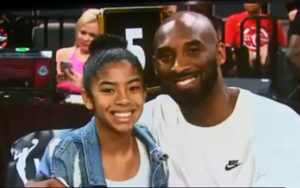
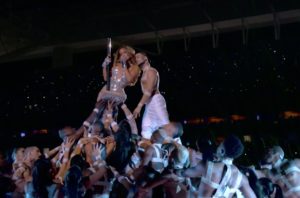
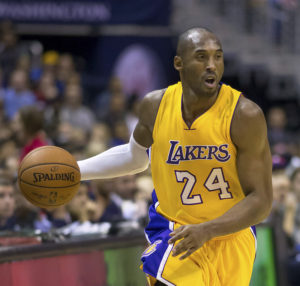
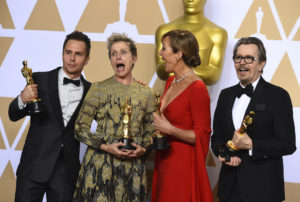

You need to be a supporter to comment.
There are currently no responses to this article.
Be the first to respond.